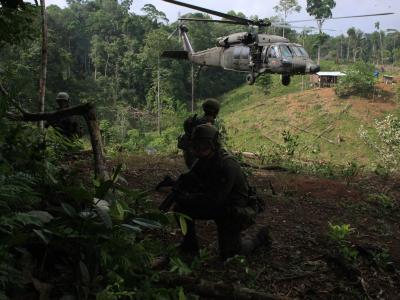Centre for the Study of Illicit Economies, Violence and Development


About
The Centre for the Study of Illicit Economies, Violence and Development (CIVAD), based at SOAS, is the hub of an international network of affiliated researchers and research organisations working on different aspects of illicit economies across the world.
Illicit economies are a fundamental development and peacebuilding challenge for our times. From the arms and drugs trades, to the smuggling of counterfeit medicines and food staples, illicit economies are not just symptoms of distorted development. In many places, they are embedded in daily lives and livelihoods, and drive development processes.
The centre aims to better understand the development and peacebuilding challenges presented by illicit economies. Its research explores the pathways through which illicit economies interact with the dynamics of conflict and development. It works to identify policies for addressing illicit economies that help build peace and promote more inclusive development.
Drugs & (dis)order
The centre is the legacy of a 4-year research programme, Drugs & (dis)order, funded by the Global Challenges Research Fund, and implemented by a consortium led by SOAS.
Drugs & (dis)order asked the question ‘how can war economies be transformed into peace economies?’, and generated a substantial body of evidence from nine drug- and conflict- affected borderland regions of Afghanistan, Colombia and Myanmar. Its outputs include datasets, journal articles, blogs, life history comics and animations, which can all be found on the Drugs & (dis)order’s website.
The centre builds on Drugs & (dis)order by widening the focus on drugs to include other illicit economies, and by expanding the geographical range of the research to include other countries where illicit economies are important.
Research
The centre is developing four strands of research:
- Illicit flows and geographies of uneven development. How does the circulation of illicit flows (capital, commodities, people, ideas) shape and connect processes of development within and across regions?
- Violence, (dis)order and public authority. What are the relationships between illicit economies, violence(s), and state and non-state orders?
- Illicit lifeworlds. What are the everyday realities, perspectives and experiences of participants in illicit economies?
- Policies and programmes addressing illicit economies and conflict. What are the dynamics and impacts of interventions that intersect with both illicit economies and state fragility?
Illicit Economies, Violence and Development seminar series (2022–23)
Modules and courses
Our SOAS distance learning module, Drugs, Conflict and Development, addresses some of the empirical, theoretical and policy debates spanning the nexus of drugs, peace and conflict, and development. It is an optional module the SOAS MSc courses in International Development and Humanitarian Action (2022/23).
Our open online course, Drugs, Peace and Development: Rethinking Policy, was launched in June 2022. Over five weeks, the course takes the learner to the conflict-affected borderlands of Afghanistan, Colombia and Myanmar, where illicit drugs are woven into everyday lives and livelihoods. It delves into the latest debates in global drug policy and the current efforts to integrate drugs, development, and peacebuilding policies. The course is open for enrolment at any time, and can be studied free of charge.
News
Contact
If you would like to get in touch, please email the CIVAD Director, Professor Jonathan Goodhand, at jg27@soas.ac.uk
Contact us
- Social media
